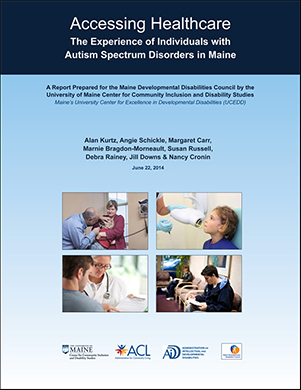Maine UCEDD and DD Council Publish Research Report - Accessing Healthcare: The Experience of Individuals with Autism Spectrum Disorders in Maine
February 2, 2015

|
The University of Maine Center for Community Inclusion and Disability Studies (ME UCEDD) and the Maine Developmental Disabilities Council have published a research report, Accessing Healthcare: The Experience of Individuals with ASD in Maine, that reveals promising positive trends, as well as areas of concern, in healthcare access for children and adults with autism spectrum disorders in Maine.
Individuals with autism spectrum disorders (ASD) are significantly more likely to have unmet healthcare needs and difficulty accessing healthcare services than those with other disabilities. Minority status, living in a rural location, and low income can exacerbate these disparities. Other obstacles to effective healthcare for individuals with ASD include the following: (1) severity of symptoms associated with ASD; (2) lack of knowledge or skill by medical practitioners; (3) lack of access to comprehensive healthcare supports or a medical home; and (4) lack of access to health insurance for needed supports and services. Individuals with ASD of all ages are likely to have a range of comorbid medical and psychological conditions, making the need for comprehensive healthcare imperative.
The Maine Developmental Disabilities Council funded research to collect information about the experience of accessing healthcare from 85 parents of children with ASD and 22 adults with ASD or their guardians who live in Maine as compared to the recommendations for the general population and existing research. A consultant conducted structured in-person interviews to collect the data and the University of Maine Center for Community Inclusion and Disabilities Studies' primary researcher, Alan Kurtz, Ph.D. Candidate and Coordinator of Education and Autism, analyzed the method, data collected, and reported the results. Report co-authors include Angie Schickle, Margaret Carr, Marnie Bragdon-Morneault, Susan Russell, Debra Rainey, Jill Downs and Nancy Cronin.
This research reveals a number of promising positive trends in healthcare for individuals with autism spectrum disorders in Maine and includes the following:
- a much earlier median age of identification and diagnosis among the youngest cohort of children;
- high ratings of overall health;
- high ratings of overall healthcare;
- satisfaction with the primary care provider (PCP);
- satisfaction with the ability of the PCP to meet the patient and family's individual needs;
- a relatively good understanding of ASD among PCPs;
- high ratings of PCP responsiveness and communication;
- relatively little difficulty finding a PCP; and
- access by most patients with ASD to regular healthcare, routine care and screening.
This research points to some areas of concern, however. These include the following:
- difficulty by a small number of respondents in finding a primary care provider (PCP) who could meet their needs;
- poor communication among some medical providers;
- failure of medical practices to make requested accommodations, especially those related to difficulty in waiting rooms;
- a very high rate of gastrointestinal (GI) issues;
- frequent failure of PCPs to notice or act upon a possible relationship between GI and behavior issues;
- lack of communication with PCPs about using alternative therapies;
- a lack of support and planning for families related to the transition to adult healthcare;
- difficulties that some patients had with completing routine care and screening procedures; and
- the inability of some individuals with ASD to communicate pain or illness in ways that are universally understood.
Funding for the survey data analysis, research, and the compilation of this report was provided through a subcontract with the Maine Developmental Disabilities Council. Additional funding support was provided by the U.S. Department of Health and Human Services, Administration for Community Living, Administration on Intellectual and Developmental Disabilities Grant No. 90DD0005. A link to the full report (95-page PDF) can be found here: https://ccids.umaine.edu/files/2015/01/MDDC_CCIDS_Accessing_Healthcare_Indiv_with_ASD_Maine_103114.pdf.







